This post examines common reasons for content marketing failure and introduces a 7 step content marketing strategy framework to mitigate the problem
Many businesses are now actively using content marketing, but it seems that there is potential for these initiatives to fail. According to the Smart Insights - HubSpot’s Managing Content Marketing Europe 2016 research as many as 72% of marketers rated their content marketing as "limited," “basic" or "inconsistent.”
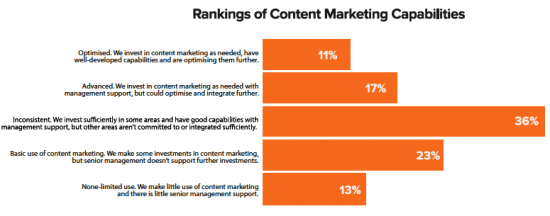
In another survey from the CMI examining content marketing usage and effectiveness, a mere 32% of those polled describe their organisation’s content marketing as “sophisticated or mature”, with just 34% saying they are effective.
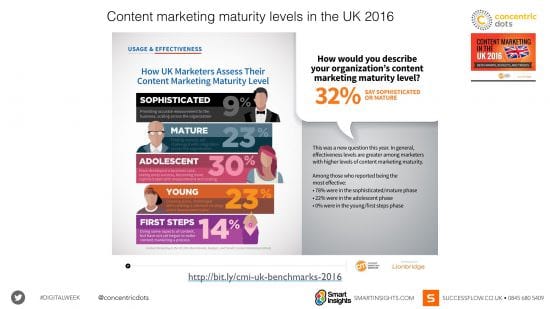
In the same report, conducted by Content Marketing Institute and MarketingProfs, the effectiveness of B2B content marketers worsened from 38 percent in 2015 to 30 percent in 2016.
This recurrent and persistent problem has doubled the resolve here at Smart Insights to help marketers plan their content marketing success. To help, we have republished our Content Marketing Strategy Guide, which I have updated and you can see a summary in my presentation of "7 Steps To Your Content Marketing Strategy Success Plan."
What is the reason for content marketing failure?
Joe Pulizzi, the godfather of content marketing and the founder of the Content Marketing Institute, says that:
“lots of companies bought into the hype and started what they thought was content marketing, but either didn’t have a strategy or didn’t execute it well … or both.”
When talking with Dave Chaffey, author of the Smart Insights - HubSpot research about the problem, he said
“it’s seems it's human nature not to plan (for many) and many of those who already have a plan need to pay more attention to optimisation.”
It's true that planning, and sticking to a plan are the critical success factors in marketing.
And because successful content marketing requires so many new skills that have not yet been learned or assimilated, the problem, it transpires, is a result of too many marketers jumping on the content marketing bandwagon too soon, not yet equipped, and insufficiently knowledgeable, and without a plan to execute.
In his opening address in January Joe Pulizzi viewed this failure through the lens of Gartner’s Hype Cycle for Digital Marketing, which frames the problem very helpfully across five cycles that you'll instantly identify with:
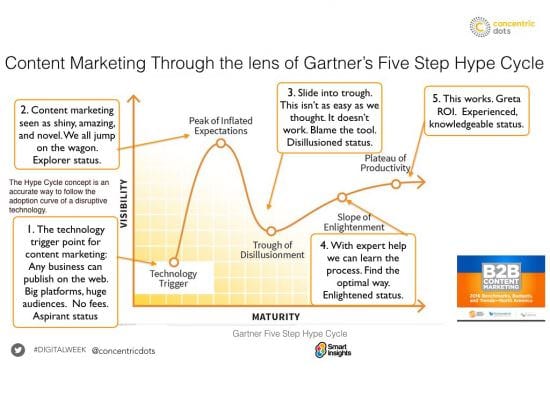
So, the question is, how can we get more proactive with our content marketing and avoid slipping into the 'trough of disillusionment'. In my presentation of "7 Steps To Your Content Marketing Strategy Success Plan, I'll go into more detail covering these three key takeaways:
1. Content distribution is key to content marketing success
To be successful with content marketing you have to proactively “market your marketing.” Don't make the mistake of planning your distribution at the last moment. Instead, plan your promotion at the outset.
By that I mean define your audiences, your channels, your reach and your KPIs. Quantify them. Use the distribution matrix to help you.
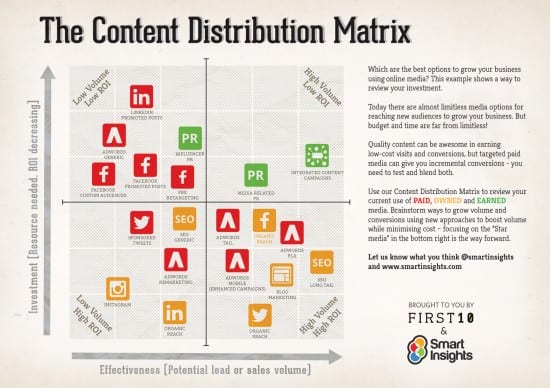
2. Research your audiences thoroughly
Content marketing failure comes from a lack of research. It’s tempting to just publish, on instinct and gut feeling. But this misses the target. So interview buyers, examine their search behaviour, create quality personas, watch your competition and talk to industry influencers to get all the critical insights to guide your content marketing success.
3. Persist when the going is tough
In my presentation I tell the story of how I built my audience to grow my app publishing business and show why, had I given up, I would have missed the rewards of successful content marketing.
Success doesn’t happen overnight with content marketing, there is a lag, which is why you have to persevere, always measuring, evaluating, rinsing, repeating in the face of adversity, and stop doing the things that don't work, so that you don't burn out and give up too soon.
Understanding content marketing is a key factor in the success of content marketing.
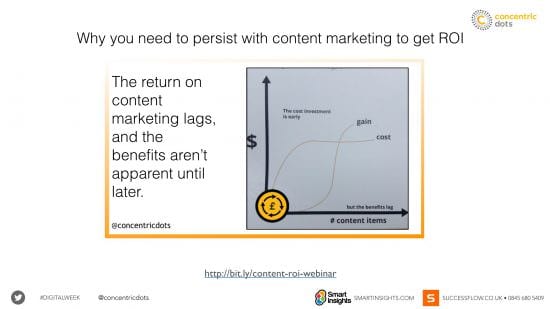
I’ll show you the web analytics for when I started my blogging, and how I didn’t have a lot of visitors, and how miserable traffic was to begin with.
But I stayed the course and tuned into my audience, observing how the pros, largely in the US, made a success of their content marketing, and that’s how I learned to write, format and illustrate better, more engaging content that earned the traction I was hoping for.
I’ll show you how I kept my bounce rate consistently below 4%.
I hope these few appetisers will entice you to join me for my presentation "7 steps to content marketing success" on Thursday 19th May, 2:00PM
Register now
Here are a five more things you’ll learn:
- how to develop a strategic content marketing success plan
- how to build trust with new audiences and turn that trust into action
- how to structure content along your funnel for a more profitable strategy
- the seven interdependent disciplines of content marketing strategy
- which metrics to use to measure the impact of your content marketing
It's also your chance to ask a question. The webinar is interactive so you can submit questions and I’ll do my best to answer as many of them as I can in the allocated time as well as cover a broad range of topics so that you all leave with plenty of knowledge and inspiration.
Book your place now, and all you need to do is show up on Thursday 19th May, 2:00PM

See you then.












